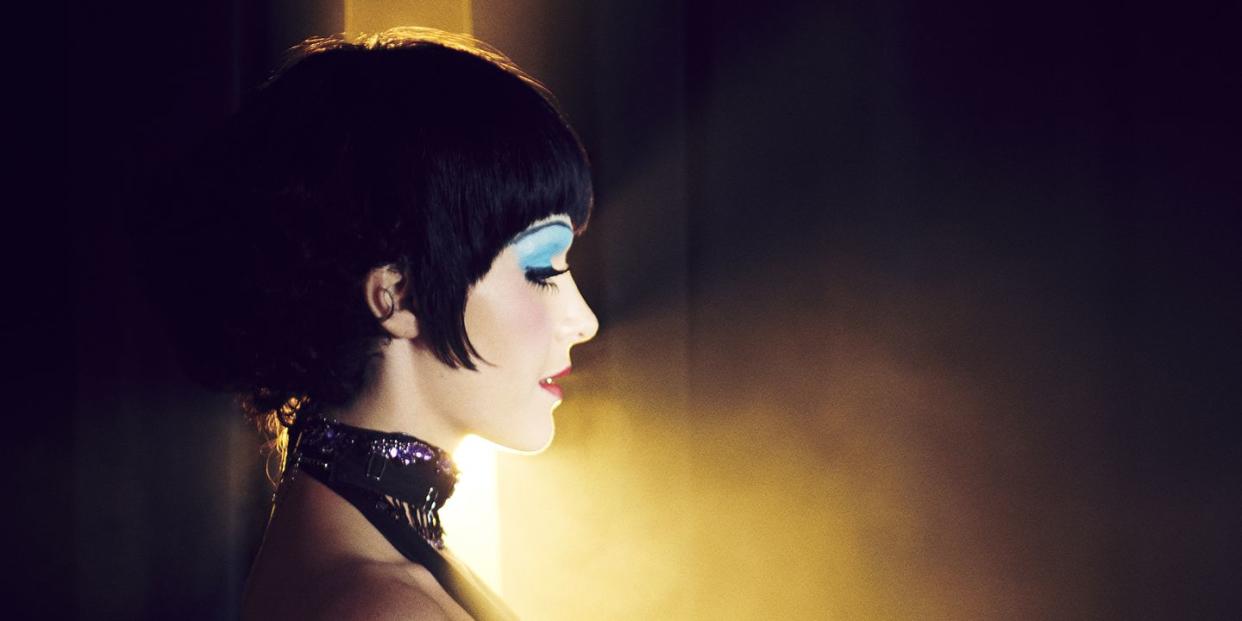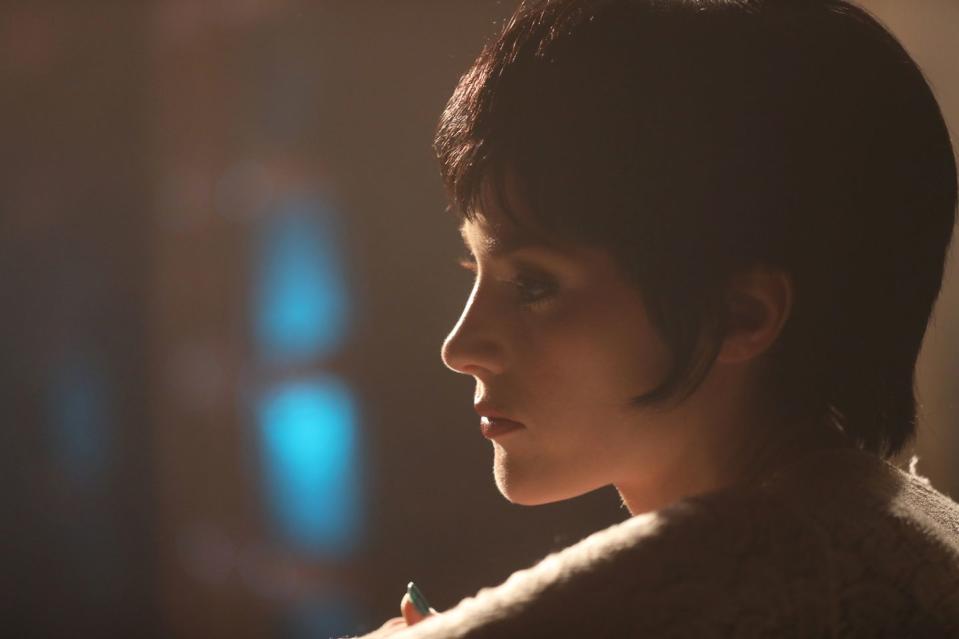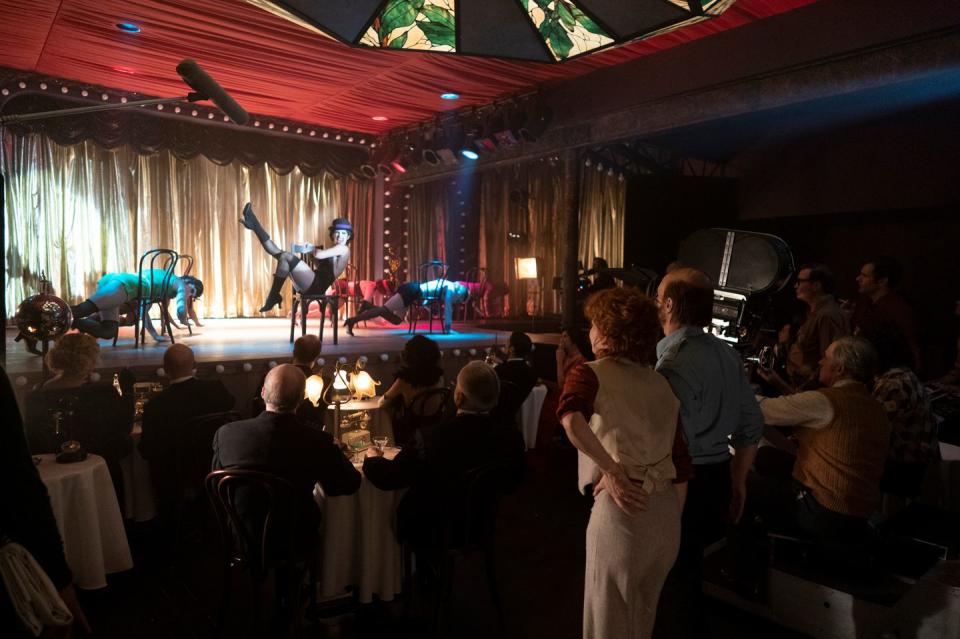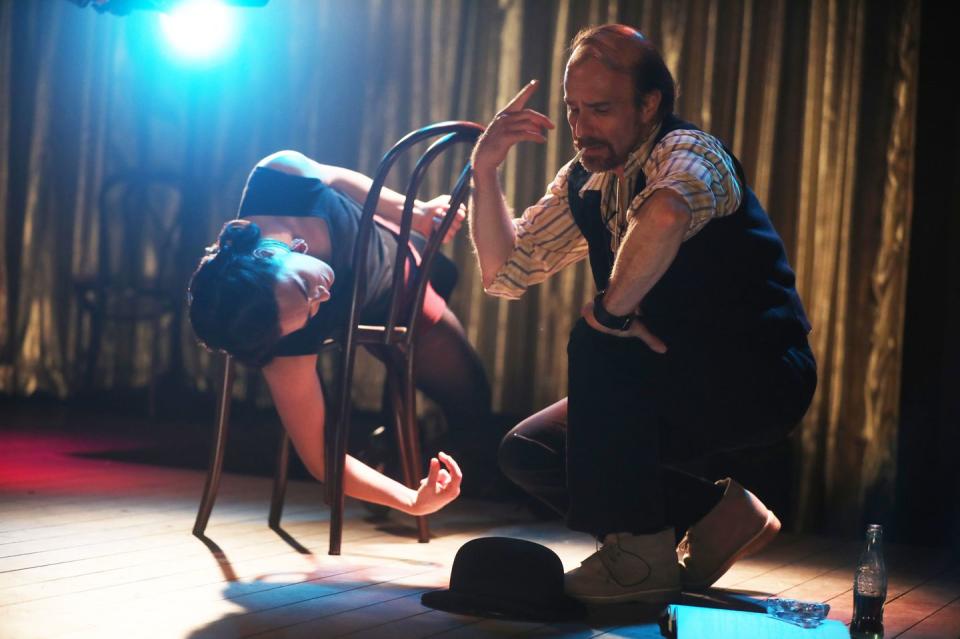Kelli Barrett Grew Up Idolizing Liza Minnelli. Now, in 'Fosse/Verdon,' She's Playing Her.

With the legendary Bob Fosse-Gwen Verdon duo at its center, Fosse/Verdon is set to be the new favorite television show of theater kids everywhere-even the ones involved in its production.
Kelli Barrett grew up idolizing Fosse and his creative circle, learning his choreography from a young age, and watching his films over and over, her face inches from the screen. Now, an accomplished stage and screen actress with roles in multiple Broadway shows under her belt, she's inhabiting one of the icons she's always admired: Liza Minnelli. Below, Barrett opens up to Town & Country about the challenge of playing a real person, the particularity of Minnelli's "saucer" eyes, and getting bruises from that chair in the Cabaret number "Mein Herr."

Do you remember the first time you saw Cabaret?
I do! I saw it on Broadway, the first revival with Alan Cumming. It was a school trip, we were coming up, it was my first experience in New York City. I remember sitting in Studio 54, watching Alan Cumming, being riveted by this show. I am very drawn to things that have a dark edge to them, and Fosse is the quintessential, that’s what he’s doing. He’s showing the dark side of humanity; he’s using the music and the feeling and the dance to rub you in a way that is just very singular to him ... And with Alan Cumming, there was a moment when he walked through the audience, and his black trench coat brushed my shoulder. And I thought, this is it for me. I’m done. I have to be here, and I have to live here, and I have to do this forever.
How do you remember thinking about Bob Fosse's work when you were young?
Well, Fosse was really special for me because I was always on the singer-dancer track. I could dance, but I wasn’t like the dancer-dancers... So I remember ballet being torture. I liked tap a lot because I was great at rhythm. Jazz was really fun, but it wasn’t until we started studying Fosse jazz-we actually had a Fosse class in high school-where my body went, "Oh, I understand this." It was the idea that when you’re dancing, you’re acting. The smallest little thing, you know, the dance could just be in your wrist for a second, but it’s all about intention. It was the first time when I was like, "Oh, I’m a dancer." I found who I was as a dancer, because of him.
So did you learn the "Mein Herr" dance before Fosse/Verdon?
No. "Mein Herr," of course I knew of it, but I never learned it. I remember going into it and watching the YouTube video, trying to do it myself in my living room and being like, "what is this?!" Because the chair was so iconic, and I was like, "Ooh, can I do this?" It’s been a long time since I’ve had to kick my leg over something.

What was the process like then, to learn the dance?
I had a bunch of sessions with Valarie Pettiford, who was one of Fosse’s muses, and she’s famous for the show Fosse. They gave me one-on-one time with her, several sessions. [Bob Fosse and Gwen Verdon's daughter and Fosse/Verdon executive producer] Nicole Fosse came it to watch it once I had learned it, to give me more, about intention and Liza’s eyes and all that kind of stuff. We brought the whole team in to watch it.
I got to work with all the Kit Kat [Club] dancers. It was eight hour days of just learning... And it was body-breaking. I was icing and I was bruised by the chair. It felt amazing. It’s exactly what you want as an actor. You want to kind of give your body something. And I did, for a few weeks. It was exhilarating.
What was it like to work with Nicole Fosse? It's rare that someone with such an intimate knowledge of a show's real-life characters is there to oversee the production.
Otherworldly. She’s so there. I mean, she gets it. She’s absolutely a product of her parents in terms of taking their insight and their skill. She’s got it all. It was just, it was amazing, to ask her, “Okay, what were they thinking about when they made this?” She can give you the intention behind the smallest movement. And as an actor, it took me out of the mindset of “I’m dancing, I’m a dancer,” into “I’m telling a story through movement.” So she was invaluable to the process.

Were there any insights she gave you that were particularly helpful?
The main one was about Liza’s eyes. You know, Liza has these giant, saucer eyes, that can say everything when she looks. They’re two of the most iconic, amazing eyes ever. And she would tell an entire novel with just the flick of her eye, looking from left to right, or how slowly she would blink.
That was another thing, for the Cabaret girls specifically, was the slow blinking. Which, it’s not only sexy, but it’s alluding to a lot of their history. Are they drugged up? Are they depressed? The darkness of a slow blink ... and trying to keep our eyes open and blinking very slowly, only when we had to. It was the idea of trying to mimic Liza’s eye movement, and trying to just stare down the barrel of a gun when you’re doing "Mein Herr." That’s what she was able to do, that laser focus. So Nicole really worked with me on that.
How did you approach playing Liza Minnelli without making it a pastiche?
Well, [executive producer Thomas] Kail used the words “loving homage.” And what was great was about the team in general was that they weren’t looking for imitation. They were working for essence.
So for me, it was Liza’s energy that I was first drawn to, even as a child. And trying to figure out, "Okay, where’s that come from? Where’s her center of gravity? Where does that all-or-nothing force come from and how do I relate to that myself as a performer?" It’s tricky trying to capture someone else and what’s so singular about them, while using your own singularity. I think that’s the difference between homage and imitation. If I can put my own authenticity into this structure, then it’s going to be better than if I just try to impersonate.
So I oddly had to still try to be myself, and the parts of myself that weren’t necessarily her, we weren’t trying to get rid of them. We were trying to enhance it. So when you watch it, it’s not my goal for you be like, "Oh, that’s Liza Minnelli." It’s my goal for you to understand her story and her essence through me, really, because I’ll never be Liza Minnelli. No one will.
A post shared by Kelli Barrett (@kelli_barrett) on Dec 20, 2018 at 9:52am PST
I understand you're a big Liza Minnelli fan, and have been since you were young. What was it about her that endeared her to you?
So it started with Judy Garland-and I think that’s true for every musical theater actress. The Wizard of Oz was all of our movie entrance into the love of musicals. And I was completely obsessed with Judy Garland and everything she was and everything she did. Her energy onscreen when she was performing was something for me that was completely singular, until Liza Minnelli.
Of course, I grew up knowing more about both of them. To me they were both kind of born from the same sun, in that they were both completely otherworldly when they were performing. I just remember as a little kid watching the screen and moving very close to the television to try to get some of it, to get some of that juice that they had. Every time they perform it feels like the last time, like they could die they’re giving so much of themselves... To me, they were the definitions of stars.
Do you think Liza Minnelli will watch the show? Do you want her to watch it?
I think she will. I do hope she will because, although that prospect terrifies me, I’ve heard she’s a very generous, lovely woman. And I hope she’ll watch it just so that she herself can be honored and feel that love from us. Because that’s all we’re trying to do, is celebrate her legacy. I want her to feel all that love coming at her, for sure.
('You Might Also Like',)
